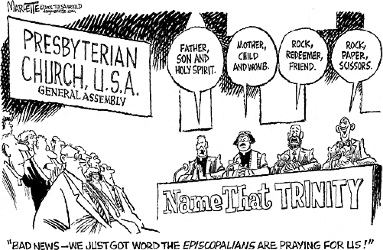« 2006 August | Main | 2006 June »
Saturday, July 29, 2006
The Kitchen Recovers
Saturday, July 22, 2006
Traveling About
All Right Get to Work
The Mold Problem Worsens!
Friday, July 21, 2006
Welcome to Our Kitchen - Care for a bite to eat?
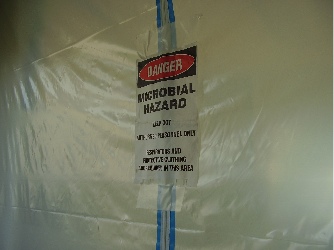
So a couple of weeks ago we discovered that the drain pipe on our kitchen sink was broken. The first clue was all of the water pouring out of our cabinet. As it turns out, the break came after it had been slow leaking for a spell (hence State Farm just won't cover this. So much for the "Good Neighbor" bit). With the slow leak comes ... no ... don't say it ... MOLD!!!! Yes, that most horrible of all things. Worse than the black death itself, its mold. Now, even the New York Times has questioned how dangerous mold is, but we couldn't get a plumber to open the dry wall (which look like it had a square foot or so of are with some mildew on it) for fear of leading to some major, world-ending, disaster. So, we had to contact a flood repair and mold remediation company. Say farewell to the cabinets, flooring, dry wall, etc. The kitchen will look odd for a while. Since we are still going to do some type of remodel (probably bump out some walls and reconfig the bedrooms as opposed to the second story which was fast approaching $400K estimated cost) we will do the kitchen remodel at the same time.
Now, I understand the concern that mold might make people ill. Although in the generally drafty world of the California tract home, I find this hard to believe. However, I think the whole remediation process has had more of an affect on the residents of this house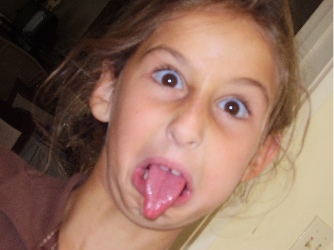 than the mold
ever will (sorry Catherine, just couldn't
resist.)
than the mold
ever will (sorry Catherine, just couldn't
resist.)
Well, at any rate, we just ordered a new range and will also get a matching dishwasher, convection/microwave, and ultimately a
refrigerator, so things will look nice. It just may take a few months to get
there.
and will also get a matching dishwasher, convection/microwave, and ultimately a
refrigerator, so things will look nice. It just may take a few months to get
there.
A Wonderful, if Melancholy, Meditation
Tuesday, July 04, 2006
Why are Protestant Bibles missing those books?
Sunday, July 02, 2006
The Meaning of Love
Too Good to Pass Up
Saturday, July 01, 2006
A Final Entry
The Kitchen Recovers
Well, the mold remediation has been completed.
Catherine has finally returned to
normal:
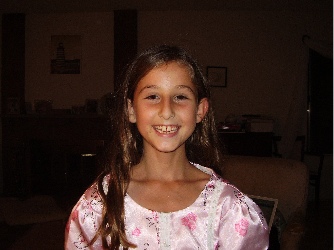
The kitchen, however, hasn't:

So now the remodel odyssey begins.

The kitchen, however, hasn't:

So now the remodel odyssey begins.
Saturday, July 22, 2006
Traveling About
So, part of the reason Catherine and I have been
so silly is because everybody else is gone. Joshua is currently finishing up
his stay in England at the UK Sailing Academy and will soon be off to
France. Claudia, Andrew, and Lislott are in Omaha at the OIF conference where Claudia has met a bunch of
doctors and gathered a lot of good information - especially for me now that I've
started fracturing again.
All Right Get to Work
Providence is a funny thing, if you're not prone
to whining. Unfortunately, I'm prone to whining. At any rate, I had set out
with great intentions when I got home from the hospital, but haven't done
terribly well in losing weight or getting in shape. So the other day, God
decided to remind me. I received an e-mail update from the OIF conference . Not from Claudia, mind you, but from the folks running
the conference. There was a big write up on the be fit aspect of the conference
and the need to manager our weight and stay in shape. Then later that day while
driving down to PT I put on some podcasts of an Orthodox radio program I like to listen to, and
ended up listening to a program about fasting and dieting. The upshot of the
program was that fasting is not about limiting certain sorts of foods (which is
what you do, but not what the focus is) but rather about controlling the
passions and the tendency toward
gluttony.
Okay, I think I get the point. Now if I would only cooperate.
Okay, I think I get the point. Now if I would only cooperate.
The Mold Problem Worsens!
Apparently Catherine has contracted a rare
disorder now which causes chocolate sauce to dribble down her chin. Stay tuned
for more...
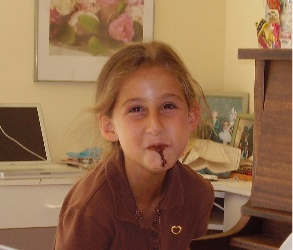

Friday, July 21, 2006
Welcome to Our Kitchen - Care for a bite to eat?

So a couple of weeks ago we discovered that the drain pipe on our kitchen sink was broken. The first clue was all of the water pouring out of our cabinet. As it turns out, the break came after it had been slow leaking for a spell (hence State Farm just won't cover this. So much for the "Good Neighbor" bit). With the slow leak comes ... no ... don't say it ... MOLD!!!! Yes, that most horrible of all things. Worse than the black death itself, its mold. Now, even the New York Times has questioned how dangerous mold is, but we couldn't get a plumber to open the dry wall (which look like it had a square foot or so of are with some mildew on it) for fear of leading to some major, world-ending, disaster. So, we had to contact a flood repair and mold remediation company. Say farewell to the cabinets, flooring, dry wall, etc. The kitchen will look odd for a while. Since we are still going to do some type of remodel (probably bump out some walls and reconfig the bedrooms as opposed to the second story which was fast approaching $400K estimated cost) we will do the kitchen remodel at the same time.
Now, I understand the concern that mold might make people ill. Although in the generally drafty world of the California tract home, I find this hard to believe. However, I think the whole remediation process has had more of an affect on the residents of this house
 than the mold
ever will (sorry Catherine, just couldn't
resist.)
than the mold
ever will (sorry Catherine, just couldn't
resist.)Well, at any rate, we just ordered a new range
 and will also get a matching dishwasher, convection/microwave, and ultimately a
refrigerator, so things will look nice. It just may take a few months to get
there.
and will also get a matching dishwasher, convection/microwave, and ultimately a
refrigerator, so things will look nice. It just may take a few months to get
there.A Wonderful, if Melancholy, Meditation
I ran across the following online here. Reminds me a bit of our traveling about
Switzerland. The land of St. Beatus and St. Gallus where there are so many
empty churches.
Orthodox in England
by Fr. Stephen Freeman
By the kindness of a friend I recently was blessed with my first trip abroad and with a greater purpose than mere tourism (though we did a bit of touring). The foremost purpose of our visit was to make pilgrimage to the Orthodox Monastery of St. John the Baptist in Essex, a few hours drive from London. The monastery is fairly unique in the Orthodox world - a common monastery - that is having both men and women - with the women quartered on one side of the village lane and the men on the other. It is a community founded by Archimandrite Sophrony of blessed memory, who had been a disciple of St. Silouan on Mt. Athos. The community bears the stamp of the spiritual legacy of St. Silouan and his disciple, the Elder Sophrony. I was aware of this uniqueness - indeed it was what drew me to the monastery in the first place. My own spiritual father had described the monastery as the “healthiest” monastery in the Western world. I am now inclined to agree. There is far too much to the monastery’s life to write about at this moment for readers of Pontifications, but I would offer the suggestion that you try reading anything of Fr. Sophrony’s that you happen to find. It will not be a waste of time.
But I offer my visit to the monastery as a prelude to my thoughts - partly because I went to the monastery first and then made the tourist trek that is the subject of my thoughts at the moment - and partly to say that my thoughts are cast against the backdrop of a week’s quiet prayer and reflection in one of the holier places in our Western world.
My trip coincided with England’s run of good fortune in the World Cup. Everyone was being quite patriotic (they lost after I left) and concerned more with Ecuador and the like than with the U.S. or Iraq. That was my good fortune as a visiting American. My visit also coincided with the Episcopal Church’s General Convention, an event that probably received better coverage in the English papers than in those of the U.S. - Anglicanism not being a mere footnote in British history. Reading of the Episcopal Church’s descent into chaos (indeed “chaos” was the word used in the Times to describe the convention) while at the same time touring some of her Mother Church’s great cathedrals made for extended meditations.
The countryside of England looked like it is supposed to - quite “English.” Beautiful green fields, with occasional mops of trees and rooftops marking the presence of a village - each with the ever present spire of a village Anglican Church. Some of them were functioning and some were not. The Cathedrals functioned - mostly for tourism and now at a price (entrance into St. Paul’s in London is 9 pounds - though as a priest identified by my Orthodox cassock I was generously and warmly admitted free of charge). But all of the tours consisted of architecture and bits of history - not piety nor devotion. But that is largely understandable. The crux of my meditation was “Orthodox England,” for indeed, this land had once been an Orthodox land. English Saints are still remembered on the Orthodox calendar. St. Theodore of Tarsus, a Greek, was among the early Archbishops of Canterbury. A cursory read of the Venerable Bede and Orthodox Britain leaps into view.
At this point I have to beg the patience of our Roman Catholics on the blog. I know that Bede and Britain were as “Catholic” as they were “Orthodox,” as were we all. But I don’t know how to look for “Catholic” England other than to remember the murdering butchery of Henry VIII (he had the monks at Walsingham drawn and quartered), and the countless brave Jesuits who labored for the Catholic faith long after England had fallen under the dark shadow of Cromwell.
My meditation was on how falsely the story of Anglicanism had been related to me when I was an Anglican - both in adult inquirers’ classes and in seminary itself - the myth of the 3 Branch theory of the Church and other stories. Lies that Henry only wanted separation from Rome for the sake of the Kingdom, to secure a male heir. Little mention was made of his butchery and theft - the Reformation was a bloody revolution, a radical madness that turned society upside down. Today’s arguments about “salvation by grace through faith,” as if such slogans justified revolutions, ring as hollow as Stalin modernizing Russia, or Mussolini making trains run on time.
Where we stand today in history is not the fault of the modern world. There is no peaceful, pious, holy Britain to point to after the Reformation. There is more bloodshed, more revolution, counter-revolution, and the gradual sinking into the secularism of the Enlightenment. Whatever started with Henry killed a holy island.
But the reminders of what once was are ubiquitous. And there are doubtless many believers who remain - indeed the holy monastery I visited is evidence that the Christian faith cannot be extinguished. Perhaps the most poignant part of my visit was to take a short ride outside of Oxford to see the home of C.S.Lewis and to visit his grave and the Church in which he worshipped. There is a small sign that points his grave out to visitors. The man who was tending the graveyard commented, “Only Americans come to see his grave.” A very kind older gentleman insisted on taking us inside and we sat in Lewis’ pew and chatted for better than an hour. I found a faith in him, though one that was mixed with many notions that Lewis would have striven to correct. The parish bulletin’s lead article was all about “labyrinths” and how neat they were and the spirituality associated with them - mostly new-age nonsense. Only Americans at the grave, and a fine theological mind now consigned to sit quietly by while a labyrinth is established for the faithful to wander through looking for God. Anglicanism itself has sunk into a labyrinth where there may be few threads to lead a pilgrim homeward.
I spent my final week praying more, I think, than I did in the monastery. I prayed for Episcopalians at home who now have to hear about “Mother Jesus” from the highest levels, and Anglicans across the world who have to sort their way through. I prayed for a land that had been spiritually raped in its past with scars to show for it. I prayed for myself not to be depressed or to think myself different from others. And I gave thanks for the clear light of faith that continues to shine in small places across that wonderful island.
At Walsingham, where Anglican, Roman Catholic, and Orthodox all have shrines to the Mother of God, I overheard a group of school children who were on a daytrip to the shrine (I do not know from what school). But their guide was sitting in the shrine with them, and pointing to the soot on the walls. “Do you know why these walls are so dark?” She asked. The children ventured several wrong answers. “They are from the candles of so many, who have prayed so many prayers in this place. It is a holy place.” Indeed. May those prayers be heard, as well as the prayers I added when I lit my candles. May the faith of the fathers of Britain shine again in that green land - Aidan, Cuthbert, Theodore, Bede, good men and women who kept the faith and knew the way home.
Orthodox in England
by Fr. Stephen Freeman
By the kindness of a friend I recently was blessed with my first trip abroad and with a greater purpose than mere tourism (though we did a bit of touring). The foremost purpose of our visit was to make pilgrimage to the Orthodox Monastery of St. John the Baptist in Essex, a few hours drive from London. The monastery is fairly unique in the Orthodox world - a common monastery - that is having both men and women - with the women quartered on one side of the village lane and the men on the other. It is a community founded by Archimandrite Sophrony of blessed memory, who had been a disciple of St. Silouan on Mt. Athos. The community bears the stamp of the spiritual legacy of St. Silouan and his disciple, the Elder Sophrony. I was aware of this uniqueness - indeed it was what drew me to the monastery in the first place. My own spiritual father had described the monastery as the “healthiest” monastery in the Western world. I am now inclined to agree. There is far too much to the monastery’s life to write about at this moment for readers of Pontifications, but I would offer the suggestion that you try reading anything of Fr. Sophrony’s that you happen to find. It will not be a waste of time.
But I offer my visit to the monastery as a prelude to my thoughts - partly because I went to the monastery first and then made the tourist trek that is the subject of my thoughts at the moment - and partly to say that my thoughts are cast against the backdrop of a week’s quiet prayer and reflection in one of the holier places in our Western world.
My trip coincided with England’s run of good fortune in the World Cup. Everyone was being quite patriotic (they lost after I left) and concerned more with Ecuador and the like than with the U.S. or Iraq. That was my good fortune as a visiting American. My visit also coincided with the Episcopal Church’s General Convention, an event that probably received better coverage in the English papers than in those of the U.S. - Anglicanism not being a mere footnote in British history. Reading of the Episcopal Church’s descent into chaos (indeed “chaos” was the word used in the Times to describe the convention) while at the same time touring some of her Mother Church’s great cathedrals made for extended meditations.
The countryside of England looked like it is supposed to - quite “English.” Beautiful green fields, with occasional mops of trees and rooftops marking the presence of a village - each with the ever present spire of a village Anglican Church. Some of them were functioning and some were not. The Cathedrals functioned - mostly for tourism and now at a price (entrance into St. Paul’s in London is 9 pounds - though as a priest identified by my Orthodox cassock I was generously and warmly admitted free of charge). But all of the tours consisted of architecture and bits of history - not piety nor devotion. But that is largely understandable. The crux of my meditation was “Orthodox England,” for indeed, this land had once been an Orthodox land. English Saints are still remembered on the Orthodox calendar. St. Theodore of Tarsus, a Greek, was among the early Archbishops of Canterbury. A cursory read of the Venerable Bede and Orthodox Britain leaps into view.
At this point I have to beg the patience of our Roman Catholics on the blog. I know that Bede and Britain were as “Catholic” as they were “Orthodox,” as were we all. But I don’t know how to look for “Catholic” England other than to remember the murdering butchery of Henry VIII (he had the monks at Walsingham drawn and quartered), and the countless brave Jesuits who labored for the Catholic faith long after England had fallen under the dark shadow of Cromwell.
My meditation was on how falsely the story of Anglicanism had been related to me when I was an Anglican - both in adult inquirers’ classes and in seminary itself - the myth of the 3 Branch theory of the Church and other stories. Lies that Henry only wanted separation from Rome for the sake of the Kingdom, to secure a male heir. Little mention was made of his butchery and theft - the Reformation was a bloody revolution, a radical madness that turned society upside down. Today’s arguments about “salvation by grace through faith,” as if such slogans justified revolutions, ring as hollow as Stalin modernizing Russia, or Mussolini making trains run on time.
Where we stand today in history is not the fault of the modern world. There is no peaceful, pious, holy Britain to point to after the Reformation. There is more bloodshed, more revolution, counter-revolution, and the gradual sinking into the secularism of the Enlightenment. Whatever started with Henry killed a holy island.
But the reminders of what once was are ubiquitous. And there are doubtless many believers who remain - indeed the holy monastery I visited is evidence that the Christian faith cannot be extinguished. Perhaps the most poignant part of my visit was to take a short ride outside of Oxford to see the home of C.S.Lewis and to visit his grave and the Church in which he worshipped. There is a small sign that points his grave out to visitors. The man who was tending the graveyard commented, “Only Americans come to see his grave.” A very kind older gentleman insisted on taking us inside and we sat in Lewis’ pew and chatted for better than an hour. I found a faith in him, though one that was mixed with many notions that Lewis would have striven to correct. The parish bulletin’s lead article was all about “labyrinths” and how neat they were and the spirituality associated with them - mostly new-age nonsense. Only Americans at the grave, and a fine theological mind now consigned to sit quietly by while a labyrinth is established for the faithful to wander through looking for God. Anglicanism itself has sunk into a labyrinth where there may be few threads to lead a pilgrim homeward.
I spent my final week praying more, I think, than I did in the monastery. I prayed for Episcopalians at home who now have to hear about “Mother Jesus” from the highest levels, and Anglicans across the world who have to sort their way through. I prayed for a land that had been spiritually raped in its past with scars to show for it. I prayed for myself not to be depressed or to think myself different from others. And I gave thanks for the clear light of faith that continues to shine in small places across that wonderful island.
At Walsingham, where Anglican, Roman Catholic, and Orthodox all have shrines to the Mother of God, I overheard a group of school children who were on a daytrip to the shrine (I do not know from what school). But their guide was sitting in the shrine with them, and pointing to the soot on the walls. “Do you know why these walls are so dark?” She asked. The children ventured several wrong answers. “They are from the candles of so many, who have prayed so many prayers in this place. It is a holy place.” Indeed. May those prayers be heard, as well as the prayers I added when I lit my candles. May the faith of the fathers of Britain shine again in that green land - Aidan, Cuthbert, Theodore, Bede, good men and women who kept the faith and knew the way home.
Tuesday, July 04, 2006
Why are Protestant Bibles missing those books?
I know the reasons often given for dropping the
"deuterocanonicals" from Protestant Bibles, but as I was reading a great piece
on the Orthodox concept of living an ascetic life , I was struck by the thought that
these books contain many very clear prophecies that point toward the coming of
Christ (Arguably that is why Pharisaic Judaism excluded these books), and in
some ways very clear warnings about the devil. For instance, "God, to be sure,
framed man for an immortal destiny, the created image of His own endless being;
but, since the devil's envy brought death into the world, they make him their
model that take him for their master" (Wisdom
2:23-25).
I think that Satan used the egotism of the reformers, coupled with the error of the Romans to remove a whole group of scripture from the hands of Christians. What better way to slowly draw people away from the truth.
I think that Satan used the egotism of the reformers, coupled with the error of the Romans to remove a whole group of scripture from the hands of Christians. What better way to slowly draw people away from the truth.
Sunday, July 02, 2006
The Meaning of Love
In the Divine Liturgy of St. John Chrysostom, the
introduction to the Nicene Creed is said by the priest: "Let us love one
another that with one mind we may confess..." and then on we go to the creed.
Such is missing from the liturgies of St. James, Mark or Peter, although the
creed tends to come after the greeting with the holy kiss, thus putting the
confession of faith alongside an expression of love. This may be the roots of
the prayer in the St. John's
liturgy.
It is interesting to reflect on the concept that loving others has anything to do with a profession of faith. We have become used to the concept, particularly those of us coming from mainline protestant denominations, that love and belief had nothing to do with one another. However, we are supposed to be the body of Christ - a divine and organic union. Part of what binds us together is our common faith (or at least is supposed to be). This makes sense, if you think of it in terms of marriage (as St. Paul would clearly have us do). After all, unless you're a movie star, most people become married to someone who shares a common view of what marriage is about, how many children, how to raise them, etc. So when we recite the creed each week, we are, in a sense, recapitulating the beliefs underlying our "marriage" to Christ through his Church. So, we are reflecting our love for one another.
To continue the analogy, then what happens when we no longer hold to the common belief? What about those churches where people are modifying the creed (to the point of a wholesale ignoring or change of meaning of key points)? I would propose that you are no longer reflecting your love for the other, because the very thing that united you in the first place, you are now changing.
It is interesting to reflect on the concept that loving others has anything to do with a profession of faith. We have become used to the concept, particularly those of us coming from mainline protestant denominations, that love and belief had nothing to do with one another. However, we are supposed to be the body of Christ - a divine and organic union. Part of what binds us together is our common faith (or at least is supposed to be). This makes sense, if you think of it in terms of marriage (as St. Paul would clearly have us do). After all, unless you're a movie star, most people become married to someone who shares a common view of what marriage is about, how many children, how to raise them, etc. So when we recite the creed each week, we are, in a sense, recapitulating the beliefs underlying our "marriage" to Christ through his Church. So, we are reflecting our love for one another.
To continue the analogy, then what happens when we no longer hold to the common belief? What about those churches where people are modifying the creed (to the point of a wholesale ignoring or change of meaning of key points)? I would propose that you are no longer reflecting your love for the other, because the very thing that united you in the first place, you are now changing.
Too Good to Pass Up
Saturday, July 01, 2006
A Final Entry
I didn't end up writing as much in this section
as perhaps I had intended. However, the "the conversion" happened a lot faster
than we anticipated. As a final note on this subject, I provide you a link to an interview with Bp. Kallistos Ware,
who himself converted to Orthodoxy a number of years ago. I find his first
response very much reflects my own "struggles" with remaining in
Anglicanism.
Soon I'll create a section just for Orthodoxy, so I can jot some reflections as I spend the next many years getting deep into the mind of the Fathers, the phronema of the Church. Part of that is studying chant, which is a lot of work, but very interesting so far, so there will be much to relate about that over time. As far as getting deep into the Church, that is hard to describe adequately. In many ways, joining Orthodoxy is like falling in love. There is a depth that you would expect to find in the Body of Christ that I don't think I've ever experienced before.
Soon I'll create a section just for Orthodoxy, so I can jot some reflections as I spend the next many years getting deep into the mind of the Fathers, the phronema of the Church. Part of that is studying chant, which is a lot of work, but very interesting so far, so there will be much to relate about that over time. As far as getting deep into the Church, that is hard to describe adequately. In many ways, joining Orthodoxy is like falling in love. There is a depth that you would expect to find in the Body of Christ that I don't think I've ever experienced before.

